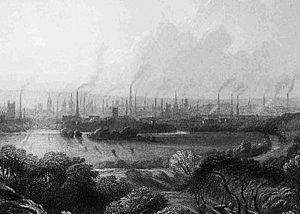Jevons paradox facts for kids
The Jevons paradox is a cool idea in economics that talks about how we use natural resources. It's also called the Jevons effect. It was first noticed in 1865 by a smart person named William Stanley Jevons.
Jevons saw something interesting with steam engines. James Watt had made a much better and more efficient steam engine than the older one by Thomas Newcomen. You'd think this would mean less coal was used, right? But actually, the use of coal in England went up!
This happened because Watt's improved engine made coal a cheaper way to get energy. Because it was cheaper, more people wanted to use Watt's steam engine. So, even though each engine used less coal, many more engines were being used. This meant the total demand for coal increased a lot.
Contents
What is the Jevons Paradox?
The Jevons paradox explains that when we use a resource more efficiently, we might actually end up using more of it, not less. This seems like a paradox, or something that goes against what you'd expect.
Think about it this way:
- When something becomes easier or cheaper to use, people tend to use it more often.
- If a car becomes super fuel-efficient, you might decide to drive more because it costs less per mile.
- If a light bulb uses very little electricity, you might leave more lights on, or for longer periods.
The paradox suggests that making something more efficient can sometimes lead to a bigger overall use of that resource.
The Story of Steam Engines
To understand the Jevons paradox, let's look at the steam engines Jevons studied:
- Thomas Newcomen's engine: This was one of the first practical steam engines, invented in 1712. It was used mainly to pump water out of coal mines. It worked, but it used a lot of coal to create its power.
- James Watt's engine: In the late 1700s, James Watt greatly improved Newcomen's design. His engine was much more efficient. This meant it could do the same amount of work using much less coal.
You might think that because Watt's engine was so much better, less coal would be needed. But the opposite happened!
Why Did Coal Use Increase?
Here's why coal use went up, even with more efficient engines:
- Lower Cost: Because Watt's engine used less coal for the same work, it made coal a cheaper and more attractive source of energy.
- More Uses: With cheaper and more powerful engines, steam power could be used for many new things. Factories started using them for machines, and trains and ships began to use them for transport.
- Increased Demand: As steam engines became cheaper and more useful, more and more of them were built and used. Even though each new engine was efficient, the sheer number of engines meant the total demand for coal skyrocketed.
So, the efficiency made coal cheaper, which led to more people using it in more ways, which then led to a huge increase in the total amount of coal burned. This is the core idea of the Jevons paradox.
Images for kids
-
William Stanley Jevons, after whom the effect is named
See also
 In Spanish: Paradoja de Jevons para niños
In Spanish: Paradoja de Jevons para niños
 | James Van Der Zee |
 | Alma Thomas |
 | Ellis Wilson |
 | Margaret Taylor-Burroughs |



